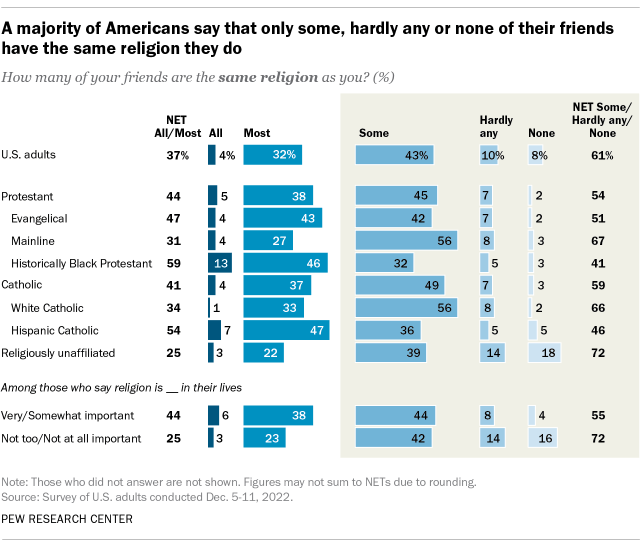It’s common for Americans to have friends of a different religion than their own.
Overall, about four-in-ten U.S. adults (37%) say that all or most of their friends have the same religion they do. But about six-in-ten (61%) report having at least some friends whose religion differs from their own, according to a December 2022 Pew Research Center survey. That includes 43% who say only some of their friends have the same religion they do and another 18% who say hardly any or none of their friends do.
Pew Research Center conducted this analysis to see how common it is for Americans to be friends with people who have different religions than their own. For this analysis, we surveyed 5,132 U.S. adults from Dec. 5 to 11, 2022. Here are the questions used for this analysis, along with responses, and its methodology.
This analysis also includes separate findings about how often Americans discuss religion with others, based on a survey of 6,364 U.S. adults conducted March 18-April 1, 2019. Here are the questions used for this analysis, along with responses, and its methodology.
Everyone who took part in both surveys is a member of the Center’s American Trends Panel (ATP), an online survey panel that is recruited through national, random sampling of residential addresses. This way nearly all U.S. adults have a chance of selection. The survey is weighted to be representative of the U.S. adult population by gender, race, ethnicity, partisan affiliation, education and other categories. Read more about the ATP’s methodology.

Americans’ friend groups tend to be more alike in ways other than their religious composition. Broad majorities of Americans with at least one close friend say all or most of their close friends are the same gender as they are (66%) and the same race or ethnicity (63%), a separate survey from July 2023 found.
Still, some demographic groups stand out for having greater religious diversity among their friends.
Men, younger adults and those with less education are slightly more likely than other Americans to say hardly any or none of their friends share their religion. For example, 20% of U.S. adults with a high school diploma or less education say hardly any or none of their friends have the same religion they do, compared with 14% of those whose highest level of education is a bachelor’s degree.
Related: 30% of Asian Americans say all or most of their friends have the same religion they do
Differences by religious identity
Particularly large shares of “nones” – those who identify religiously as atheist, agnostic or “nothing in particular” – report having friends whose religious identities differ from their own. About four-in-ten (39%) in this group say only some of their friends have the same religion they do, while another 32% say hardly any or none of them do.
Other groups, in turn, are more likely to have religiously similar friend circles. Members of historically Black Protestant churches (59%) and Hispanic Catholics (54%), for example, are among the most likely of all Christian groups analyzed to say all or most of their friends have the same religion they do. This includes 13% of those in the historically Black Protestant tradition who say all of their friends share their religion. (There are not enough respondents from smaller U.S. religious groups, such as Muslims and Jews, to report on their answers separately.)
It’s important to note that how Americans define religious belonging may vary. For example, it’s unclear whether all Christian respondents would consider a friend from a different Christian denomination as having “the same religion” as they do, or whether atheists would consider agnosticism the same religion – or a religion at all, for that matter. These findings only reflect Americans’ self-perceptions of their religion and others’ connections to it.
Perhaps unsurprisingly, Americans who highly value religion are much more likely to have friendship circles where most people are from their own religious tradition. More than four-in-ten U.S. adults who say religion is very or somewhat important in their lives (44%) say all or most of their friends have the same religion they do. Just a quarter of those who say religion is not too or not at all important in their lives report the same.
Talking about religion with others
While it’s common for Americans to befriend people from different faiths, most do not discuss religion with others very frequently, according to a separate survey conducted in spring 2019.
Only about three-in-ten U.S. adults (31%) said in 2019 that they talk about religion with others outside their family once or twice a month or more often.
In the same survey, 62% of U.S. adults said that when someone disagrees with them about religion, it’s best to try to understand the person’s belief and agree to disagree. A third said it’s better to avoid discussing religion with the person, while just 4% said it’s best to try to persuade the other person to change their mind.
Note: Here are the questions used for this analysis, along with responses, and its methodology.
Research Analyst Michelle Faverio contributed to this analysis.
